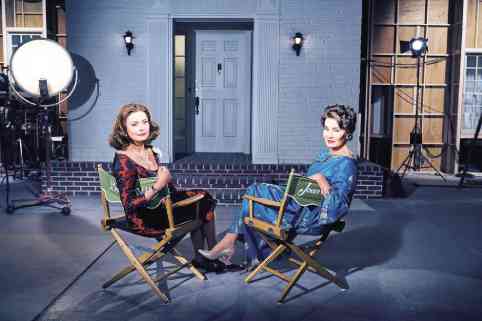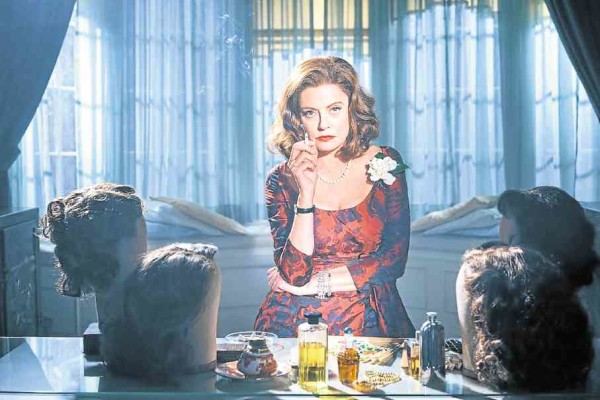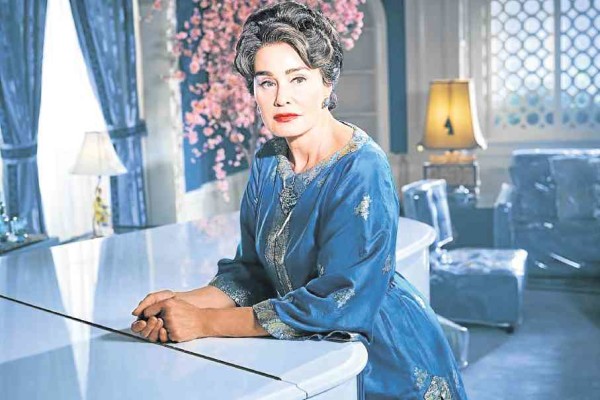Susan Sarandon and Jessica Lange go for the kill as feuding queens
LOS ANGELES—“She’s been in movies since the silents. You’d think she could act by now,” Bette Davis once carped about her rival, Joan Crawford. Not to be outdone, Joan retorted, “I will have her respect even if I have to kill both of us to get it.”
Back in the days when the phrase “politically incorrect” was still decades away from being coined, Hollywood actors had very public feuds, like the rivalry between movie queens Bette and Joan in the ’30s and ’40s. Their feud was as legendary as their iconic status.
Who better to bring this long-simmering catfight than Ryan Murphy, fresh from the success of his “The People v. OJ Simpson”?
In “Feud: Bette and Joan,” FX’s eight-episode anthology series, Ryan serves a delicious dish starring Susan Sarandon as Bette and Jessica Lange as Joan. It’s fun and campy but Ryan, at Susan’s suggestion, crafted more than just the queens bickering at each other.
Focusing on the production of “What Ever Happened to Baby Jane?,” the 1962 thriller that starred the two rivals, Ryan created a feminist tale of Bette and Joan exploited by men, the press and the studio system.
Article continues after this advertisementSusan, who has, as Kim Carnes sang in her hit, “Bette Davis Eyes,” is perfect as one of the greatest actresses in Hollywood. Jessica is equally compelling as the actress with the thick eyebrows and full lips.
Article continues after this advertisementRyan also picked the rest of the cast very well: Judy Davis (as gossip queen Hedda Hopper), Catherine Zeta-Jones (Olivia de Havilland), Stanley Tucci (Jack Warner) and Alfred Molina (Robert Aldrich).
Fittingly, we interviewed Susan and Jessica separately. Excerpts from our chat:
Susan Sarandon
In preparing to play Bette Davis, what were the interesting things you learned? I didn’t realize that when she took on the studios, she was only 25, which shocked me. I didn’t know that much about her personal life—how driven she was. As I started watching her interviews, she said a lot of the same things I say in interviews. That was spooky.
She was an outsider in terms of the Hollywood system, being from the East Coast and the theater, which I related to. Like Bette, I see myself as a character actor and not a leading lady.
I was surprised when I heard her speak; how contemporary she sounded. She was ballsy. I read something from a director, who said she wasn’t difficult because she was a diva. She was difficult because she was Bette Davis, and her standards were very high. She expected professionalism above all.
Bette couldn’t stand Faye Dunaway. Because when Bette worked with her, Faye kept everybody waiting hours and hours. Bette would never do anything like that. She wanted to collaborate. But, at the same time, if things weren’t going well, she definitely fought to make things happen. I respected her for that.
Ryan Murphy said that you were offered to play Bette Davis five times. What made you say “yes” to this one? I wasn’t interested in playing Bette Davis just to play Bette Davis. I’m not a drag queen. This wasn’t going to be like a one-joke appearance. Some of the scripts just didn’t work.
Even when Ryan first brought me the script, I said it needed something else besides bickering. What he did brilliantly was find a context, a bigger canvas to ask other questions and to bring it up to the present—to examine the feud, but not make it just about these two women bitching at each other.
I read a script about her early days. There was another script about how Bette went to the Hamptons for the film festival there. She stayed with a family and didn’t leave for two months (laughs). She completely disrupted the family.
That was an interesting story, but the script didn’t quite work. It takes a lot to make a script work. Even though I didn’t see the [“Feud”] scripts, I trusted Ryan.
Jessica Lange
What did you learn about Joan Crawford that made you understand the human behind the legend? Joan came to Hollywood in 1925. She started in the silents as a dancer. That was what she wanted to do. She didn’t aspire to be an actor. If you look at those early silent films of hers, there’s just this wonderful abandon and earthy quality, in a way almost this sexuality and vulgarity.
F. Scott Fitzgerald said Joan embodied the jazz baby of that period. So that was Joan in the ’20s. In the ’40s, she moved into this scrappy Mildred Pierce phase like a woman overcoming the worst of times.
Somehow, Joan embodied this sense of the times…the ’40s…
the ’50s, even. Then, Hollywood changed dramatically in the ’60s. Suddenly, you had films like “Easy Rider.” They (Joan and actors from the earlier era) became obsolete in a way—their idea of film and also their kind of acting.
Suddenly, it shifted. People [attributed] it to Marlon Brando. But I think it was Monty (Montgomery) Clift, where the whole style of acting shifted suddenly.
Joan credited MGM for her entire education. She only had a fifth-grade education. So, they taught her how to speak in this upper-class, mid-Atlantic accent. I call it “MGM speak.” The studios imported dialect coaches from New York theater.
She was from San Antonio (Texas). She never spoke like that. She even talked about how, when she first started reading scripts, she didn’t know what some of the words meant. She had to sit with a dictionary. The actors were also taught how to walk.
All of that is kind of studied—you could call it unnatural. By the time you get to the ’60s, that whole way of acting was basically out of fashion. With that, coupled with the kind of movies that were being made—not the kind of women’s films that these actresses were used to and the fact that they were now in their 50s, 60s, suddenly it came crashing down.
After having spent four decades exalted as this movie goddess, that was hard for Joan. It was a difficult adjustment to make. What’s interesting to me is how many left Hollywood at a certain point. It was just too hard. Greta Garbo, Olivia de Havilland—they all physically moved out. Joan, Bette and Katharine Hepburn did. Ava Gardner ended up in London.
It was probably very difficult to be here and be considered obsolete.
In your career, were you ever involved in a feud? When you’re on movie sets, because of all the egos that come together in rather volatile situations, there are conflicts. But there was nothing I would classify as a feud.
E-mail [email protected]. Follow him at https://twitter.com/nepalesruben.


